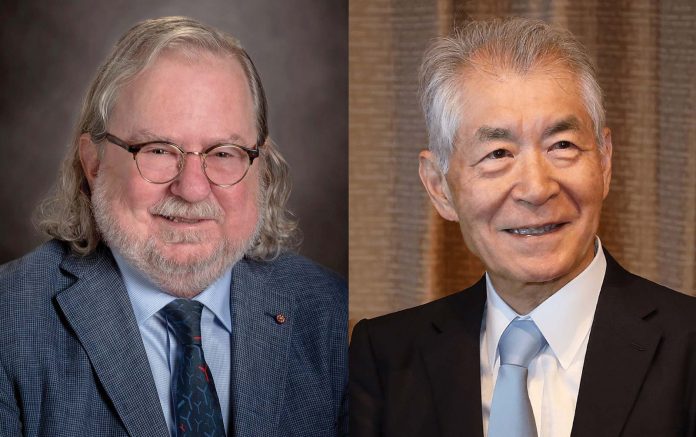Posted: December 2018
James P. Allison, PhD, and Tasuku Honjo, PhD, MD, were jointly awarded the 2018 Nobel Prize in Physiology or Medicine for their breakthrough accomplishments in cancer immunotherapy, leading to creation of a new highly effective and rapidly developing class of drugs, the immune checkpoint inhibitors, which have recently transformed the therapeutic landscape in thoracic malignancy.
Dr. Honjo, of Kyoto University, discovered the programmed cell death protein-1 (PD-1) that is expressed on the surface of T cells and its connection with the immune response. He also realized that if the protein expression was blocked, or inhibited, the immune response against a cancer would be bolstered. PD-1 inhibitors were developed after blockade was shown to be an effective method of cancer control by Dr. Honjo. PD-1 expression levels quickly became a biomarker to predict efficacy for this new class of agents, and results for some patients, including many with metastatic disease, have been dramatic.
Dr. Allison, of the University of Texas MD Anderson Cancer Center, has also researched T-cell proteins. His work in CTLA-4 led to development of successful blockade of this protein, thereby “taking the brakes off ” of the immune system and increasing anti-tumor T-cell activity. Almost a decade after his work began, ipilimumab yielded increased overall survival and disease-free survival for patients with advanced melanoma, compared with other traditional therapies. This agent, in combination with PD-1 inhibitors, is also being tested in patients with advanced NSCLC and SCLC, with some success, particularly in patients with high tumor mutation burden.
Previously, researchers had been working on protein-related immunebased solutions to numerous autoimmune conditions and other diseases. Drs. Honjo and Allison, however, revolutionized cancer care—leading to an increased number of options and to better results for patients in later disease stages. Immunotherapy is not without its side effects, but ongoing research is working to determine how best to minimize toxicity and which combinations or dose Dr. James P. Allison Dr. Tasuku Honjo schedules are most effective. ✦











